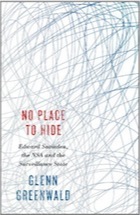-

- The Guardian, Friday 23 May 2014 07.30 BST

At the outset of Glenn Greenwald’s communications with the „anonymous leaker“ later identified as 29-year-old former NSA employee Edward Snowden, Greenwald – a journalist, blogger and former lawyer – and the film-maker Laura Poitras, with whom he is collaborating, are told to use a PGP („pretty good privacy„) encryption package. Only then will materials be sent to him since, as Snowden puts it, encryption is „not just for spies and philanderers“. Eventually Greenwald receives word that a Federal Express package has been sent and will arrive in a couple of days. He doesn’t know what it will contain – a computer program or the secret and incriminating US government documents themselves – but nothing comes on the scheduled day of delivery. FedEx says that the package is being held in customs for „reasons unknown“. Ten days later it is finally delivered. „I tore open the envelope and found two USB thumb drives“ and instructions for using the programs, Greenwald writes.
His account reminded me of the time, nearly a decade ago, when I was researching Britain’s road to war in Iraq, and went through a similar experience. I was waiting for an overnight FedEx envelope to reach me in New York, sent from my London chambers; it contained materials that might relate to deliberations between George Bush and Tony Blair (materials of the kind that seem to be holding up the Chilcot inquiry). A day passed, then another, then two more. Eventually, I was told I could pick up the envelope at a FedEx office, but warned that it had been tampered with, which turned out to something of an understatement: there was no envelope for me to tear open, as the tearing had already occurred and all the contents had been removed. FedEx offered no explanation.
As Greenwald notes, experiences such as this, which signal that you may be being watched, can have a chilling effect, but you just find other ways to carry on. FedEx (and its like) are avoided, and steps are taken to make sure that anything significant or sensitive is communicated by other means. In any event, and no doubt like many others, I proceed on the basis that all my communications – personal and professional – are capable of being monitored by numerous governments, including my own. Whether they are is another matter, as is the question of what happens with material obtained by such surveillance – a point that this book touches on but never really addresses. Greenwald’s argument is that it’s not so much what happens with the material that matters, but the mere fact of its being gathered. Even so, his point is a powerful one.
This is the great importance of the astonishing revelations made by Snowden, as facilitated by Greenwald and Poitras, with help from various news media, including the Guardian. Not only does it confirm what many have suspected – that surveillance is happening – but it also makes clear that it’s happening on an almost unimaginably vast scale. One might have expected a certain targeting of individuals and groups, but we now know that data is hoovered up indisciminately. We have learned that over the last decade the NSA has collected records on every phone call made by every American (it gathers the who, what and when of the calls, known as metadata, but not the content), as well as email data. We have learned that this happens with the cooperation of the private sector, with all that implies for their future as consorts in global surveillance. We have learned, too, that the NSA reviews the contents of the emails and internet communications of people outside the US, and has tapped the phones of foreign leaders (such as German chancellor Angel Merkel), and that it works with foreign intelligence services (including Britain’s GCHQ), so as to be able to get around domestic legal difficulties. Our suspicions have been confirmed that the use of global surveillance is not limited to the „war on terror“, but is marshalled towards the diplomatic and even economic advantage of the US, a point Greenwald teases out using the PowerPoint materials relied on by the agencies themselves. Such actions have been made possible thanks to creative and dodgy interpretations of legislation (not least the Patriot Act implemented just after 9/11). These activities began under President Bush, and they have been taken forward by President Obama. It would be a generous understatement to refer to British „cooperation“ in these matters, although Greenwald’s intended audience seems to be mostly in the US, and he goes light on the British until it comes to the treatment of his partner, David Miranda, who was detained in the UK under anti-terror legislation.
When the revelations first came out, in the summer of 2013, Snowden explained that he „had the capability without any warrant to search for, seize, and read your communications“. That meant „anyone’s communications at any time“, he added, justifying the public disclosure on the grounds that this „power to change people’s fates“ was „a serious violation of the law“. Snowden’s actions, and the claims he has made, have catalysed an important debate in the US, within Congress (where views have not necessarily followed party lines) and among academics and commentators. Views are polarised among reasonable individuals, such as New Yorker legal writer Jeff Toobin („no proof of any systematic, deliberate violations of law“), and the New York Review of Books’s David Cole („secret and legally dubious activities at home and abroad“), and in the US federal courts. In Britain, by contrast, the debate has been more limited, with most newspapers avoiding serious engagement and leaving the Guardian to address the detail, scale and significance of the revelations. Media enterprises that one might have expected to rail at the powers of Big Government have remained conspicuously restrained – behaviour that is likely, over the long term, to increase the power of the surveillance state over that of the individual. With the arrival of secret courts in Britain, drawing on the experience of the US, it feels as if we may be at a tipping point. Such reluctance on the part of our fourth estate has given the UK parliament a relatively free rein, leaving the Intelligence and Security Committee to plod along, a somewhat pitiful contrast to its US counterparts.
The big issue at stake here is privacy, and the relationship between the individual and the state, and it goes far beyond issues of legality (although Snowden’s fear of arrest, and perhaps also Greenwald’s, seems rather real). It is in the nature of government that information will be collected, and that some of it should remain confidential. „Privacy is a core condition of being a free person,“ Greenwald rightly proclaims, allowing us a realm „where we can act, think, speak, write, experiment and choose how to be away from the judgmental eyes of others“.
Snowden’s revelations challenge us to reflect on the ideal balance between the power of the state to know and the right of the individual to go about her or his business unencumbered, and this in turn raises fundamental questions about the power of the media, on which Greenwald has strong views, usually (but not always) fairly articulated. He makes the case for Snowden, and it’s a compelling one. One concern with WikiLeaks acting independently was the apparently random nature of its disclosures, without any obvious filtering on the basis of public interest or the possible exposure to risk of certain individuals. What is striking about this story, and the complex interplay between Snowden, Greenwald, Poitras and the Guardian, is that the approach was different, as the justification for the leaks seems to have been at the forefront of all their minds. In his recent book Secrets and Leaks Rahul Sagar identified a set of necessary conditions for leaks. Is there clear evidence of abuse of authority? Will the release threaten public safety? Is the scale of the release limited? Many people, though not all, see these as having been met in the Snowden case.
Britain needs a proper debate about the power of the state to collect information of the kind that Snowden has told us about, including its purpose and limits. The technological revolution of the past two decades has left UK law stranded, with parliament seemingly unable (and perhaps unwilling) to get a proper grip on the legal framework that is needed to restrain our political governors and the intelligence services, not least in their dance with the US. „The greatest threat is that we shall become like those who seek to destroy us“, the legendary US diplomat George Kennan warned in 1947. In response, revelations can be made, Greenwald’s book published, and a Pulitzer prize awarded. Long may it go on.











